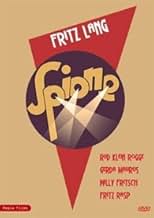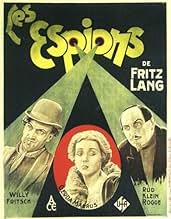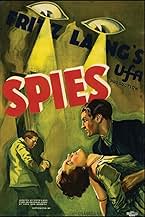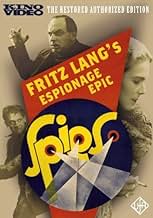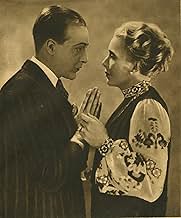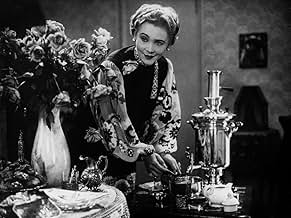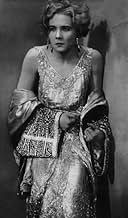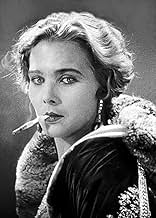AVALIAÇÃO DA IMDb
7,5/10
4,2 mil
SUA AVALIAÇÃO
O cérebro por detrás de uma operação de espionagem omnipresente descobre um romance perigoso entre uma rapariga russa ao seu serviço e um agente ousado do serviço secreto do governo.O cérebro por detrás de uma operação de espionagem omnipresente descobre um romance perigoso entre uma rapariga russa ao seu serviço e um agente ousado do serviço secreto do governo.O cérebro por detrás de uma operação de espionagem omnipresente descobre um romance perigoso entre uma rapariga russa ao seu serviço e um agente ousado do serviço secreto do governo.
- Direção
- Roteiristas
- Artistas
- Prêmios
- 1 indicação no total
Grete Berger
- Unconfirmed Role
- (não creditado)
Julius Falkenstein
- Hotel Manager
- (não creditado)
Heinrich Gotho
- Burton Jason's Other Assistant
- (não creditado)
Heinrich Gretler
- Spy in the Post Office scene
- (não creditado)
Gustl Gstettenbaur
- Boy Who Helps No. 326
- (não creditado)
Georg John
- Locomotive Engineer
- (não creditado)
Theodor Loos
- Handelsminister
- (não creditado)
Klaus Pohl
- Burton Jason's Assistant
- (não creditado)
Avaliações em destaque
Spione (Spies) is a Fritz Lang film about spy espionage. The plot is strangely more complicated than more recent spy flicks (which is a good thing). The film focuses on No. 326, a spy that is responsible for investigating leads on a mysterious mastermind that controls a network of spies. The mastermind, known as Haghi, plots to steal an important treaty. It turns out that he leads a double life as the owner of a successful bank (which apparently makes him richer than Henry Ford). Things get complicated when Haghi sends a female spy, Sonya, to prevent No. 326 from interfering. Sonya falls in love with No. 326 while still under the supervision of Haghi, leading to the usual conflicts.
The acting and characterization was wonderful. Haghi is the definition of bad guy: you know he is evil when you see the goatee. Confined to a wheelchair, he is the perfect blend of intelligence and deceptiveness. Agent No. 326 is an interesting character, although he loses some of his features as the film progresses. Sonya is beautiful and acted wonderfully. Among the side characters, I found that Colonel Jellusic and Doctor Masimoto stood out.
Although a little overlong, the film is at no point slow. Mixing fast pacing with well-placed plot twists (which really build up towards the end), anyone with interest in the subject should have no problem enjoying it for the entire running time.
I was not sure what to expect from Spione before watching it, seeing that it is a largely forgotten film. I enjoy Fritz Lang films, and this was no exception. It may not be the caliber of M, but it succeeds anyway. If you do not mind silent films and enjoy the spy/espionage genre (namely, James Bond), then you will enjoy this one.
The acting and characterization was wonderful. Haghi is the definition of bad guy: you know he is evil when you see the goatee. Confined to a wheelchair, he is the perfect blend of intelligence and deceptiveness. Agent No. 326 is an interesting character, although he loses some of his features as the film progresses. Sonya is beautiful and acted wonderfully. Among the side characters, I found that Colonel Jellusic and Doctor Masimoto stood out.
Although a little overlong, the film is at no point slow. Mixing fast pacing with well-placed plot twists (which really build up towards the end), anyone with interest in the subject should have no problem enjoying it for the entire running time.
I was not sure what to expect from Spione before watching it, seeing that it is a largely forgotten film. I enjoy Fritz Lang films, and this was no exception. It may not be the caliber of M, but it succeeds anyway. If you do not mind silent films and enjoy the spy/espionage genre (namely, James Bond), then you will enjoy this one.
"Spies" is much more entertaining than you would expect an old German silent movie to be, and at first, it's hard to say why. The character types are familiar from hundreds of other spy movies: a villain who is bent on world domination and has multiple secret identities, a beautiful blonde who works as a spy for the villain, a dashing enemy agent who falls in love with the female spy. The plot is fairly ludicrous, though it moves along briskly and provides for some great set-pieces, such as an exhilarating chase scene. But despite all the clichés found in "Spies," the movie still feels fresh and vital. You get drawn into the world of the film and accept the clichés, rather than becoming distracted by them.
I'm sure most of the credit for this has to go to the director, Fritz Lang. His films ("Metropolis," "M") often have a very dark world view, but the overall tone of "Spies" is escapist adventure-fantasy. It aims to provoke thrills, not shock or outrage. Lang creates some stunning visual compositions and proves to be a very detail-oriented directorhe delights in close-ups of spy gadgetry! His innovative use of montages, dramatic lighting, camera movement, and other techniques gives the film an interesting stylization.
I'm writing this review after watching the 90-minute American version of "Spies". But I had such a good time that I may have to seek out the 146-minute version!
I'm sure most of the credit for this has to go to the director, Fritz Lang. His films ("Metropolis," "M") often have a very dark world view, but the overall tone of "Spies" is escapist adventure-fantasy. It aims to provoke thrills, not shock or outrage. Lang creates some stunning visual compositions and proves to be a very detail-oriented directorhe delights in close-ups of spy gadgetry! His innovative use of montages, dramatic lighting, camera movement, and other techniques gives the film an interesting stylization.
I'm writing this review after watching the 90-minute American version of "Spies". But I had such a good time that I may have to seek out the 146-minute version!
Fritz Lang, undeniably one of the greatest and most influential film-makers in all of cinema, is one of my favorites and, from his early work which remains, perhaps, his most important I only had a few of his surviving films still to catch up with. SPIONE was one of them and, now that I've watched it, I can confirm its stature as one of his very best, if relatively little-known.
The film is basically a follow-up to Lang's seminal two-part DR. MABUSE, THE GAMBLER (1922) and, indeed, it's Rudolph Klein-Rogge himself who originated the role of Mabuse who plays the evil crimelord here (called Haghi and who is made-up to resemble Lenin!). SPIONE follows much the same pattern of intrigue, thrills and action; however, the film's narrative structure is not straightforward but rather elliptical and, even though ostensibly dealing with the conflict which may arise were a treaty to fall into the wrong hands, several major plot points are left deliberately obscure (in fact, we never get to know what the treaty actually contains a precursor to Hitchcock's beloved "McGuffin", perhaps or what Haghi's intentions are, once he gets his hands on it!). In this respect, the social conscience so pronounced in the Mabuse diptych coming, as it did, on the heels of Germany's defeat in WWI is largely jettisoned here in favor of romance (between a female spy desired, and being blackmailed, by Haghi and the Secret Service agent who is the mastermind's nemesis), eroticism (the ensnaring of a central political figure by a vamp in Haghi's service) and technical dexterity (ensuring that SPIONE's considerable 2½-hour running-time goes by rapidly and without any longueurs, in my estimation at least, as opposed to the sluggish and rather static Mabuse). It is not inconceivable, therefore, to discern in Lang's fanciful melodrama the germ for all the spy thrillers which followed from Hitchcock to the James Bond extravaganzas and beyond.
As befits a master story-teller like Lang, particularly during this most creative phase of his career, SPIONE is virtually a catalogue of memorable scenes (interestingly enough, the supplementary photo gallery includes shots from sequences that are missing in the main feature!) chief among them a ghostly visitation, a ritual suicide, a train-wreck, a police raid on a bank and a stage performance by a clown; however as opposed to the DVD back-cover, which blatantly spells out its most clever twist in emulation of the film itself, I've refrained from giving too much away about them here
The film is basically a follow-up to Lang's seminal two-part DR. MABUSE, THE GAMBLER (1922) and, indeed, it's Rudolph Klein-Rogge himself who originated the role of Mabuse who plays the evil crimelord here (called Haghi and who is made-up to resemble Lenin!). SPIONE follows much the same pattern of intrigue, thrills and action; however, the film's narrative structure is not straightforward but rather elliptical and, even though ostensibly dealing with the conflict which may arise were a treaty to fall into the wrong hands, several major plot points are left deliberately obscure (in fact, we never get to know what the treaty actually contains a precursor to Hitchcock's beloved "McGuffin", perhaps or what Haghi's intentions are, once he gets his hands on it!). In this respect, the social conscience so pronounced in the Mabuse diptych coming, as it did, on the heels of Germany's defeat in WWI is largely jettisoned here in favor of romance (between a female spy desired, and being blackmailed, by Haghi and the Secret Service agent who is the mastermind's nemesis), eroticism (the ensnaring of a central political figure by a vamp in Haghi's service) and technical dexterity (ensuring that SPIONE's considerable 2½-hour running-time goes by rapidly and without any longueurs, in my estimation at least, as opposed to the sluggish and rather static Mabuse). It is not inconceivable, therefore, to discern in Lang's fanciful melodrama the germ for all the spy thrillers which followed from Hitchcock to the James Bond extravaganzas and beyond.
As befits a master story-teller like Lang, particularly during this most creative phase of his career, SPIONE is virtually a catalogue of memorable scenes (interestingly enough, the supplementary photo gallery includes shots from sequences that are missing in the main feature!) chief among them a ghostly visitation, a ritual suicide, a train-wreck, a police raid on a bank and a stage performance by a clown; however as opposed to the DVD back-cover, which blatantly spells out its most clever twist in emulation of the film itself, I've refrained from giving too much away about them here
In the space of the first one minute and 37 seconds, a safe is burgled, a diplomat is killed, two secret documents are stolen, and an intertitle demands "WHO IS BEHIND THIS?" We're off in the world of Fritz Lang's "Spies"
This film has everything that would later become spy film cliches: the ultra cool, ultra suave secret agent; the evil powerful genius, confined to a wheelchair, who dreams of world domination; his beautiful seductress, who falls for the secret agent. There are hidden microphones and disappearing ink and secret packages and bulletproof wallets. There's a motorcycle/car chase, and an in-tunnel train wreck to round out the action.
This film has everything that would later become spy film cliches: the ultra cool, ultra suave secret agent; the evil powerful genius, confined to a wheelchair, who dreams of world domination; his beautiful seductress, who falls for the secret agent. There are hidden microphones and disappearing ink and secret packages and bulletproof wallets. There's a motorcycle/car chase, and an in-tunnel train wreck to round out the action.
The powerful criminal and leader of a spy ring Haghi (Rudolf Klein- Rogge) uses his spies that are infiltrated everywhere including in the secret service in attempts to steal documents from the French Embassy in Shanghai and from the Minister of Trade that is murdered. The press questions and mocks the officials in charge of security of state and the efficient Agent No. 326 a.k.a. the vagrant Hans Pockzerwinski (Willy Fritsch) is summoned by the Secret Service Chief (Craighall Sherry) to investigate the wave of crimes. Agent 326 immediately identifies that his chief's assistant Vincent is a spy that is providing inside information to the evil mastermind that no one knows how looks like. Meanwhile, Haghi saves the scoundrel Hans Morrier (Louis Ralph) from the gallows to serve him. Then Haghi, who is also the general director of the Haghi Bank, blackmails Mrs. Leslane (Hertha von Walther), who is the wife of the powerful Roger Lesland and habitué of an opium den, to get information of the Japanese Secret Treaty. When Haghi assigns his master spy Sonya Baranilkowa (Gerda Maurus) to get closer to the elegant Agent No. 326, they unexpectedly fall in love for each other affecting Haghi's evil scheme. Meanwhile his spy Kitty (Lien Deyers) lures and seduces the reserved and efficient Japanese agent Akira Matsumoto (Lupu Pick) to steal his documents about the recently signed Treaty that may bring war to the world.
"Spies" is a fantastic epic of espionage, romance, seduction and betrayal by Fritz Lang and I dare to say that James Bond stories might have been inspired in this film. I saw "Spies" yesterday in a restored authorized edition of the DVD released by Kino Video, and in the Extras there is the amazing story of the restoration of this film. The 35 mm archives in nitrate throughout the world were very damaged and incomplete, but this complex version was assembled from several copies using the guidance of the copy from Prague that was the most complete and also deteriorated. The result is a film of 143 minutes running time meaning 50 minutes longer than any version previously released. My vote is eight.
Title (Brazil): "Os Espiões" ("The Spies")
"Spies" is a fantastic epic of espionage, romance, seduction and betrayal by Fritz Lang and I dare to say that James Bond stories might have been inspired in this film. I saw "Spies" yesterday in a restored authorized edition of the DVD released by Kino Video, and in the Extras there is the amazing story of the restoration of this film. The 35 mm archives in nitrate throughout the world were very damaged and incomplete, but this complex version was assembled from several copies using the guidance of the copy from Prague that was the most complete and also deteriorated. The result is a film of 143 minutes running time meaning 50 minutes longer than any version previously released. My vote is eight.
Title (Brazil): "Os Espiões" ("The Spies")
Você sabia?
- CuriosidadesUFA insisted on the film being made inexpensively, as Fritz Lang's previous film Metrópolis (1927) had brought the studio to near bankruptcy. Lang therefore chose to do most of the shots in narrow settings with lots of close-ups, as no big sets had to be built up for that way of filming. Fortunately "Spione" became a huge success.
- Erros de gravaçãoWhen Sonya and Franz (the chauffeur) are tied up and trying to escape, the hand cranking the camera is visible.
- ConexõesEdited into Fritz Lang, le cercle du destin - Les films allemands (2001)
Principais escolhas
Faça login para avaliar e ver a lista de recomendações personalizadas
- How long is Spies?Fornecido pela Alexa
Detalhes
- Tempo de duração
- 2 h 30 min(150 min)
- Cor
- Mixagem de som
- Proporção
- 1.33 : 1
Contribua para esta página
Sugerir uma alteração ou adicionar conteúdo ausente


